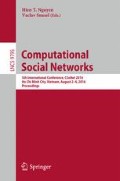Abstract
Many linguists claim as many as half of the world’s nearly 7,105 languages spoken today could disappear by the end of this century. When a language becomes extinct, communities lose their cultural identity and practices tied to a language, and intellectual wealth. Preservation of endangered languages is a critical but challenging effort. A language is not preserved and revitalized by just documenting, archiving and developing shared resources. The revitalisation is highly dependent on the learning and usage of the language. Most current systems and approaches do one or the other. There are few systems or approaches that interweave preservation with learning. The purpose of our research is to architect a language revitalisation system that (a) leverages and integrates crowd-sourced collective intelligence approaches with knowledge management approaches to (b) capture, curate, discover, and learn endangered languages. We propose and implement an generalisable architecture that can support any language revitalisation effort in terms of capture, curate, discover, and learn. The validity of the research was tested by implementing the system to support Te Reo Maori and Vietnamese. Furthermore, we evaluate the concepts, processes, architecture, and implementation using a number of mechanisms.
Access this chapter
Tax calculation will be finalised at checkout
Purchases are for personal use only
References
Romaine, S.: Preserving endangered languages. Lang. Linguist. Compass 1, 115–132 (2007)
Krauss, M.: The world’s languages in crisis. Language (Baltim) 68, 4–10 (1992)
Fishman, J.: Reversing language shift: theoretical and empirical foundations of assistance to threatened language. Multilingual Matters (1991)
Nettle, D., Romaine, S.: Vanishing Voices: The Extinction of the World’s Languages. Oxford University Press, Oxford (2000)
Gibbs, W.W.: Saving dying languages. Sci. Am. 287, 78–85 (2002)
Grenoble, L.A., Whaley, L.J.: Saving Languages: An Introduction to Language Revitalization. Cambridge University Press, Cambridge (2005)
Brenzinger, M., Yamamoto, A., Aikawa, N., Koundiouba, D., Minasyan, A., Dwyer, A., Grinevald, C., Krauss, M., Miyaoka, O., Sakiyama, O.: Language vitality and endangerment. In: Paris: UNESCO Intangible Cultural Unit, Safeguarding Endangered Languages, 1 July 2010. UNESCO (2003)
Crystal, D.: Language Death. Cambridge University Press, Cambridge (2002)
Dwyer, A.M.: Tools and techniques for endangered-language assessment and revitalization. Minor. Lang.Today’s Glob. Soc. (2012)
Goodfellow, A.M.: Speaking of Endangered Languages: Issues in Revitalization. Cambridge Scholars Publishing, Newcastle upon Tyne (2009)
Hinton, L., Hale, K.L.: The Green Book of Language Revitalization in Practice. Academic Press, San Diego (2001)
Amery, R.M.: Warrabarna Kaurna! Reclaiming an Australian Language. Swets & Zeitlinger BV, Lisse (2000)
King, J.: Te Kohanga reo: Maori language revitalization. In: The Green Book of Language Revitalization in Practice, pp. 119–128 (2001)
Kubátová, J.: Growth of collective intelligence by linking knowledge workers through social media. Lex ET Sci. Int. J. 1, 135–145 (2012)
Kaplan, A.M., Haenlein, M.: Users of the world, unite! The challenges and opportunities of Social Media. Bus. Horiz. 53, 59–68 (2010)
Lewis, B.K.: Social media and strategic communications: attitudes and perceptions among college students. Public Relat. J. 4(3), 1–23 (2010)
Engel, D., Woolley, A.W., Jing, L.X., Chabris, C.F., Malone, T.W.: Reading the mind in the eyes or reading between the lines? Theory of mind predicts collective intelligence equally well online and face-to-face. PLoS One 9, e115212 (2014)
Merriam-Webster Dictionary: “Design” Meaning. http://www.merriam-webster.com/dictionary/design
Baskerville, R.: What design science is not. Eur. J. Inf. Syst. 17, 441–443 (2008)
Nunamaker Jr., J.F., Chen, M., Purdin, T.D.M.: Systems development in information systems research. J. Manag. Inf. Syst. 1(3), 89–106 (1990)
Hevner, A.R., March, S.T., Park, J., Ram, S.: Design science in information systems research. MIS Q. 28, 75–105 (2004)
Mirza, A., Sundaram, D.: Design and Implementation of socially driven knowledge management systems for revitalizing endangered languages. In: Helms, R., Cranefield, J., van Reijsen, J. (eds.) Social Knowledge Management in Action, in the Knowledge Management and Organizational Learning Series. Springer, Berlin (2016)
Mirza, A., Sundaram, D.: Harnessing collective intelligence to preserve and learn endangered languages. In: Proceedings of 2nd EAI International Conference on Nature of Computation and Communication, Rach Gia, Vietnam (2016)
Nonaka, L., Takeuchi, H., Umemoto, K.: A theory of organizational knowledge creation. Int. J. Technol. Manag. 11, 833–845 (1996)
Alavi, M., Leidner, D.E.: Review: knowledge management and knowledge management systems: conceptual foundations and research issues. MIS Q. JSTOR 25(1), 107–136 (2001)
Lévy, P.: Collective Intelligence. Plenum/Harper Collins, New York (1997)
Malone, T.W., Laubacher, R., Dellarocas, C.: Harnessing Crowds: Mapping the Genome of Collective Intelligence. MIT Sloan Research Paper No. 4732-09 (3 Feb 2009)
Statistics New Zealand: 2013 Census QuickStats about Māori - Statistics New Zealand (2013)
Author information
Authors and Affiliations
Corresponding author
Editor information
Editors and Affiliations
Rights and permissions
Copyright information
© 2016 Springer International Publishing Switzerland
About this paper
Cite this paper
Mirza, A., Sundaram, D. (2016). Architecting Crowd-Sourced Language Revitalisation Systems: Generalisation and Evaluation to Te Reo Māori and Vietnamese. In: Nguyen, H., Snasel, V. (eds) Computational Social Networks. CSoNet 2016. Lecture Notes in Computer Science(), vol 9795. Springer, Cham. https://doi.org/10.1007/978-3-319-42345-6_29
Download citation
DOI: https://doi.org/10.1007/978-3-319-42345-6_29
Published:
Publisher Name: Springer, Cham
Print ISBN: 978-3-319-42344-9
Online ISBN: 978-3-319-42345-6
eBook Packages: Computer ScienceComputer Science (R0)

